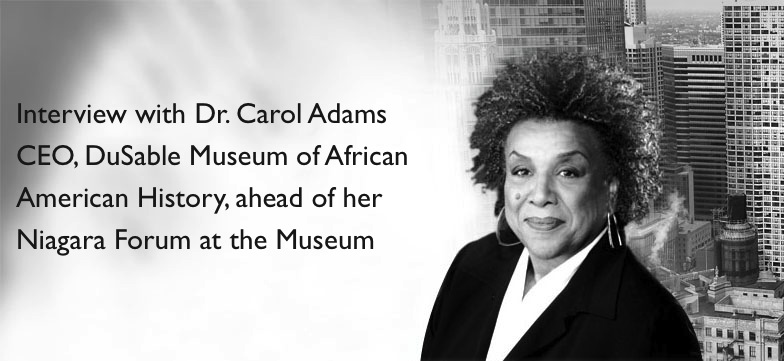I spoke with Dr. Carol Adams of the DuSable Museum of African American History last week. She will be speaking at a Niagara Forum at the museum in a couple weeks and we wanted to get a sense of what she’ll be speaking about before the program. If you would like to register for that event, you may do so here. Keep in mind it’s not at our offices, but at the museum! Special thanks to Social Media Intern Aundrea Holland for transcribing the interview and Writing and Reporting intern Megan Deppen for researching questions. – Eleanor Peck, Director of Communications and Member Relations
Eleanor Peck: Ok. So first, the topic of your speech will be on African American History in a global context. Could you give us a quick description of what you will be discussing in that topic?
Carol Adams: I will be talking about what happened in Africa, and the US at the same time, in terms of what happened to Africans and people of African descent. I’ll be starting with the Berlin Conference and the division of Africa among the subsequent colonial powers. So when you understand those things, you are able to have a fuller understanding of African and African American History. I’m going to try to summarize those movements through our movement for liberation. In other words, our civil rights movement and the independence movement in Africa at that time. I’m going to discuss the spread of African people throughout the world, because since our children are taught very little about us, sometimes they think we only exist in Africa and in the United States. They don’t know that we are a global people.
EP: What would you say are the similarities or differences, maybe, in understanding African American History locally versus internationally? How does the way you discuss African American history change based on whether you’re here in Chicago or whether you’re on an international level?
CA: Well, I don’t think that the discussion changes, but I think the issue is that the discussion isn’t being held. I have found in my travels that just like African Americans don’t know enough about Africa, some Africans don’t know enough about us and our experiences. There was a period of time when leaders from here and from Africa met and discussed common problems and common strategies. They did that through something called the Pan African Congress, and it brought these leaders together in a regular way, talking about common solutions to these problems, and my suggestion is we need to return to that as a way of approaching our issues. I want to talk about that and its impact and its impact on our identity as a people, because slavery had an awful lot to do with that. If African Americans don’t know the country of their origin, they respond to Africa in a generic way. So if something happens in a particular country, there’s not necessarily a concern. You don’t even relate to that place. You know? If something comes up about Italy, Italians are going to respond, or if something comes up in Ireland you’ll get a response from Irish people.
EP: Just switching gears a little bit to the museum: After you became CEO of the museum, you said that your vision was for it to become a strong, self-sustaining institution. Have you accomplished this and how has the museum grown since?
CA: It is a work in progress. It has grown. Our membership is growing and the more members you have, that grows your independence, and the more individual contributors you can cultivate, that also grows your independence, so those are things that all not for profit institutions work on. They’re never done, they just keep doing them.
EP: Right. We know about that for sure.
CA: I bet.
EP: Do you have any other events you’re putting on for Black History month?
CA: Many, they’re all on the website. We’ve been doing events all this month, and frankly Black History Month is not that different for us, except to the extent to which we go out and more people come in. We have just as many events every month of the year.
EP: Awesome.
CA: You know, as a African American History Museum, that’s our focus all the time.
EP: I’m really looking forward to your talk. Thank you so much for taking the time to do this.
CA: Alright, and thank you.

